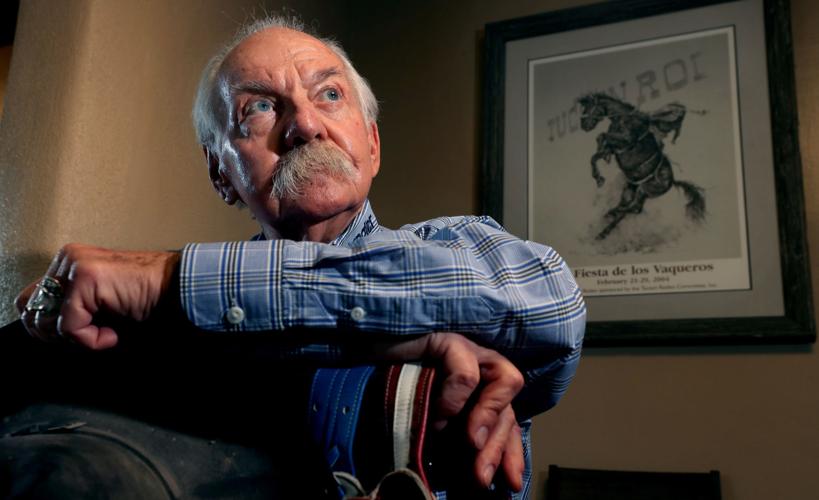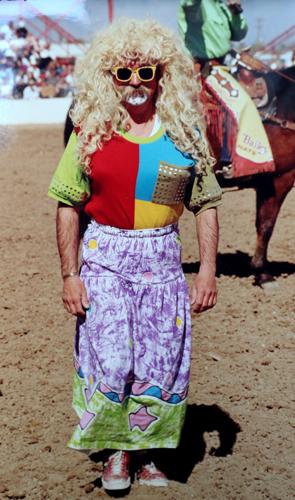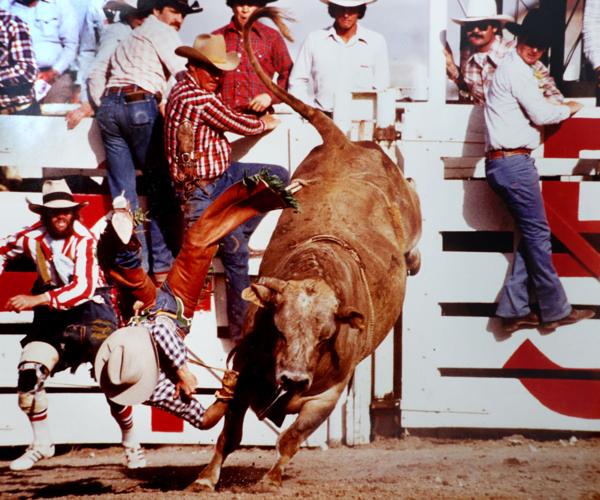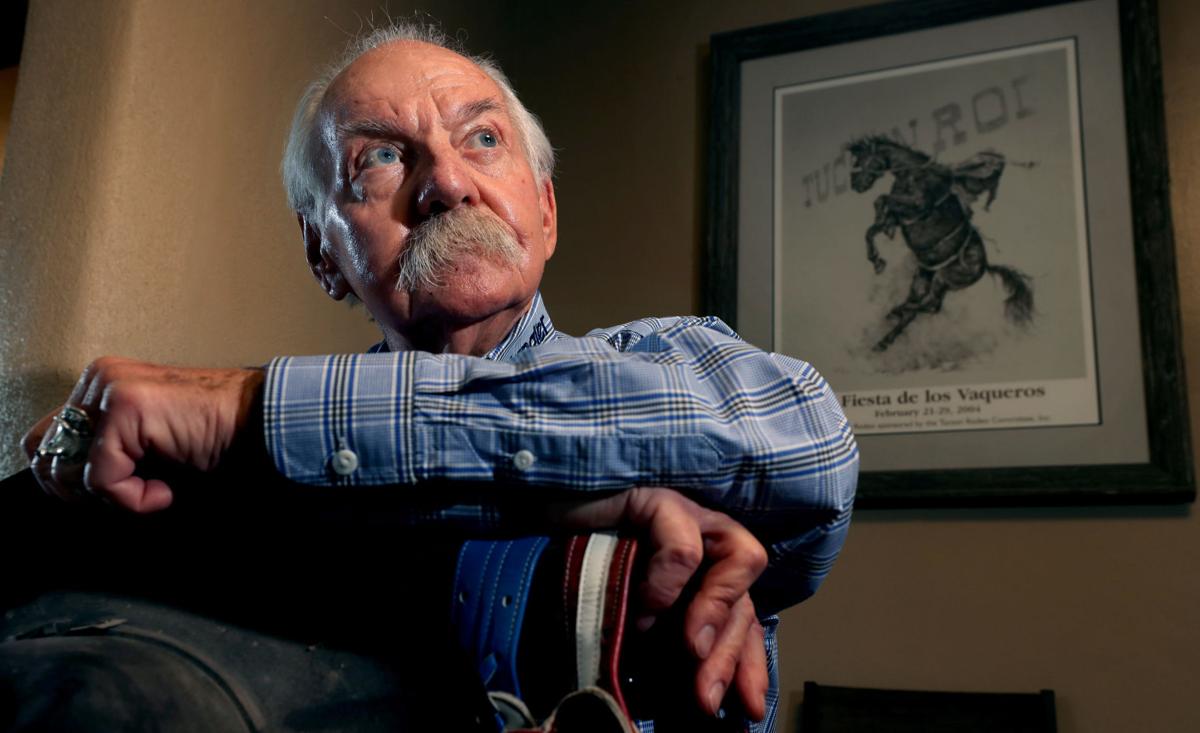The first time I requested an interview with Gary Williams, I was told he was with a stock contractor near the roughstock chute.
“He’s got a black cowboy hat and a big white mustache,” I was told. “Can’t miss him.”
No, you could not miss Gary Williams at La Fiesta de los Vaqueros. He was a bigger-than-life personality in a tidy, 5-foot-and-change frame, a cowboy for life — the kind of character you’d expect to see in a John Wayne movie at Old Tucson.
“Gary looks the part, doesn’t he?” says Dr. Eddie Taylor, a UA grad who was the 2019 Pro Rodeo Cowboys Association Veterinarian of the Year. “He’s got such a presence. He’s known and respected around the country not only by the stock contractors and announcers but by the bull riders and cowboys.”
About 35 years ago, Taylor and Williams were volunteers, newbies, at the Tucson Rodeo. They rose to national prominence together — “brothers from different mothers,” says Taylor — as the Tucson Rodeo evolved from a homespun winter festival to its status as one of the world’s 25 leading rodeos.
“That’s pretty darn prestigious,” says Taylor. “There are about 650 rodeos in this country, and now we’re ranked in the top 20. Why? A lot of it was Gary.”
Typical of so many things in sports, you don’t fully appreciate someone until he is gone. After 25 years as the only general manager in the 95-year history of the Tucson Rodeo, Williams quietly announced his retirement last week.
There will be no going-away party because February’s rodeo has been canceled. The rodeo people I’ve talked to use two words to describe the news of Williams’ retirement:
“Oh no.”
The Rincon High School and UA grad, the son of a Southern Pacific railroad man whose veins pumped rodeo blood, grew up to be a bull rider, a rodeo clown, an executive at the Arizona-Sonora Desert Museum and, in his last act, a bigger-than-life figure in the rodeo business.
Don’t expect him to take a bow. Williams’ modesty has never been bucked off a bronc.
“I came on the rodeo committee in 1987 during a time that first-year people were put on the parking committee. They called us ‘coneheads,’ ” he remembers, chuckling. “Well, they found that I couldn’t line the parking lot in straight lines so they said, ‘We need to find you something else to do.’ ”

Gary Williams’ time as Tucson Rodeo’s GM included wild times — like when he dressed up to entertain in 2000.
Williams shifted to marketing, something at which the Tucson Rodeo had not done to the best of success. At the time, La Fiesta de los Vaqueros did not sell sponsorships. It didn’t even sell beer.
“You could bring your own six-pack,” says Williams. Paying bills was a yearly struggle. Prize money was minimal, The only signage on the walls at Tucson Rodeo Grounds was “Welcome to the Tucson Rodeo.”
“It was the craziest thing,” says Williams. “But one day I got a call out of the blue from a guy I had known from my days as a rodeo cowboy — a guy from the Justin boot company — and he said they were about to end their sponsorship of the Phoenix rodeo. Would we be interested?”
Oh yeah.
Justin Boots have occupied a front-and-center space at the Tucson Rodeo since 1989, surrounded by dozens of other corporate sponsors. Two years later, Williams was appointed vice chairman. By 1995, he was named the first general manager in the rodeo’s long history, which dates to 1925.
He stayed a while.
“If you see Gary at the National Finals Rodeo in Las Vegas, everybody knows him,” says Taylor. “He’s been on the executive committee for the NFR. We’re going to miss him.”
Given his father Gene’s passion for rodeo, Williams seemed destined to be involved in the Tucson Rodeo. Gene, who also was a drummer in a Tucson rodeo band that the cowboys frequented, became friends with immortal rodeo champions Jim Shoulders and Casey Tibbs.
When young Gary Williams would wander into the chute area at the Tucson Rodeo Grounds, it wasn’t uncommon for Shoulders and Tibbs to stand watch and keep him out of harm’s way. It wasn’t unusual if they accompanied Gene Williams to the family home near Rincon High School.
“Those guys were 9 feet tall and bulletproof,” Williams says. “I was in awe. I would always say I wanted to be like them.”

Gary Williams is thrown from Grandmama Alice after a successful ride at the 1982 Tucson Rodeo. Williams, a longtime cowboy, was named the first general manager in event history in 1995.
Williams might have kept grinding for another few Tucson Rodeos, but the last year was especially difficult. His mother, Audrey — who was almost as well known at the rodeo grounds as her son — died last December. Two days later, his brother, Mike, had a stroke and died shortly thereafter.
“It’s been a tough year for everyone, not just me,” says Williams. “But after my mom and brother died, I decided I needed to take a little time away. I didn’t want to tie up the position and apply for a leave, so I just thought it was better for everyone if I retired.
“There were so many good times; I enjoyed it every step of the way. It was one helluva ride.”
Photos: La Fiesta de los Vaqueros Tucson Rodeo through the years

Little Cowpunchers riding in the 1938 Tucson rodeo parade. Victor Aros is in the front, left. Pete Aros is standing in the middle, the only one without a cowboy hat. Photo courtesy of Victor Aros.

1948 rodeo at Tucson Rodeo Grounds on South Sixth Ave.

Roping action at La Fiesta de los Vaqueros Tucson Rodeo in 1949.

Tucson Citizen newsboys distribute newspapers at the 1951 rodeo parade.

Rodeo parade spectators fill the streets at Stone and Alameda in 1951.

A couple of cowboys participate in a wild horse race during the 1961 La Fiesta de los Vaqueros. A three-man team tries to control a wild horse long enough to put a saddle on its back. Then one of the team members has to ride it, usually across a finish line. Tucson Citizen file photo

A bull rider crawls away from a bull, most likely as fast as he can during the 1961 La Fiesta de los Vaqueros. Photo by Bruce Hopkins / Tucson Citizen

With a firm grip, a steer wrestler brings his steer to a stop during the 1963 La Fiesta de los Vaqueros. Tucson Citizen file photo

Dick Pttman hangs on during bronc riding at the Tucson Rodeo in 1971.

Competitors for the bushiest beard of the 1971 La Fiesta de los Vaqueros. The Grand Prize winner was Joe Lowry, at right.

The 1972 La Fiesta de los Vaqueros rodeo.

Legendary rodeo photographer Louise Serpa photographed Dee Dunning on a bull during the La Fiesta de los Vaqueros Tucson Rodeo in 1972.

John Kowskal holds on tight to his horse during the La Fiesta de los Vaqueros Tucson Rodeo in 1973.

A bull rider makes a quick exit off his ride during the La Fiesta de los Vaqueros Tucson Rodeo in 1973.

A barrel racer's hat flies off while making the turn during the La Fiesta de los Vaqueros Tucson Rodeo in 1974.

Rodeo clown Quail Dobbs takes the fast way out of the arena during the La Fiesta de los Vaqueros Tucson Rodeo in 1974.

A.R. Young wallows in the mug after throwing a calf during steer wrestling in 1983.

Kelly Tierney of South Dakota makes a turn during barrel racing during the La Fiesta de los Vaqueros Tucson Rodeo in 1984.

A rodeo clown distracts a bull after throwing its rider during the La Fiesta de los Vaqueros Tucson Rodeo in 1984.

Wade Leslie gets tossed around like a rag doll while on a bull in his event on March 2, 1986 during La Fiesta de los Vaqueros. Photo by Xavier Gallegos / Tucson Citizen

Rodeo clown Ted Kimzey fishes from a raft in the middle of the rodeo area during the La Fiesta de los Vaqueros Tucson Rodeo in 1987.

Tate Wyly ropes his buddy Casey Simon during the La Fiesta de los Vaqueros Tucson Rodeo in 1989.

Quadrille de Mujeres stand before the crowd during the La Fiesta de los Vaqueros Tucson Rodeo in 1990.

A steer throws a cowboy during La Fiesta de los Vaqueros in 1996.

Bullfighter Rob Smets smiles after being thrown from a bull at the Fiesta de Los Vaqueros rodeo in 1998.

Bull rider Robbie Miller is underneath the bull, Gator, as he is being after being knocked off of the fence as he was trying to escape the bull in 1998. The man in the yellow coat in the ring was trying to come to the aid of Robby but there was nothing he could really do at this point but try and distract him.

Rusty Hamilton from Capitan, New Mexico takes down a steer during steer wrestling on the fourth day of the La Fiesta de los Vaqueros rodeo in 1998.

Doug Forzani gets a lift from a bull during the Wrangler/Western Warehouse Bullfight contest at the 75th Annual Tucson Rodeo in 2000.

Craig Hicks leaps from his horse and onto a calf during the Steer Wrestling competition at the 79th Annual Tucson Rodeo in Tucson, Arizona on Sunday Feb. 22, 2004.

Rodeo photographer Louise Serpa stands among many of her rodeo photographs at her home on Tuesday, February 8, 2005.

Nathan Klassen tries his best to get away from 'Getcha Some' during the 81st annual La Fiesta De Los Vaqueros at the Tucson Rodeo Grounds on February 18, 2006.

Lindz Sears of Ropesville, Texas, goes around the third barrel in the Women's Barrel Race at the Tucson Rodeo finals, Sunday, Feb. 24, 2008.

B.J. Schumacher gets booted from 'Undertow' in the bull riding competition during the 83rd Annual Tucson Rodeo, Friday, February 22, 2008.

Saddle Bronc rider Heith DeMoss prepares for the finals on a horse named Night Latch at the Tucson Rodeo finals, Sunday, Feb. 24, 2008.

Mutton Busting competitors put on their game faces prior to competing at the Fiesta de Los Vaqueros Feb. 27, 2010 at the Tucson Rodeo Grounds.

Luke Butterfield hangs onto the rail as his horse rares-up in the shoot before heading out into the arena Saturday, February 20, 2010 during the Saddle Bronc Riding event.

Saddle bronc rider Cody Wright has trouble with his first re-ride horse, Many Bubbles, as it rears up in the chute at the end of the performance at La Fiesta de los Vaqueros on Friday, February 26, 2010.

Olin Hannum of Malad, Idaho, steer wrestles in a time of 5.4 seconds at the Tucson Rodeo, Friday, Feb. 25, 2011.

Hunter Herrin comes off of his horse and during the Tie-Down Roping event of the 86th annual La Fiesta de los Vaqueros Tucson Rodeo on Sunday, February 20, 2011.

Caleb Bennett hangs on during the bareback riding competition at the 87th Annual Tucson Rodeo on Thursday, Feb. 23, 2012.

Beau Clark hides through the dirt and during the slack Steer Wrestling competition in 2012.

The Lunderville family heading to get the girls' horses for them to ride in the competition. From left to right: Melisa, mom; Dylan, 6; Peyton, 8; Taylor, 11; Chad, father; in 2013.

Chance Campbell, coming off his horse and onto the steer during the Steer Wrestling event at the Tucson Rodeo, La Fiesta de los Vaqueros, Sunday February 24, 2013, in Tucson, Arizona. Photo by Benjie Sanders/Arizona Daily Star

Monty Lewis, roping the steer and getting ready to come off his horse to tie it down in the Tie-Down Roping event during the Tucson Rodeo, La Fiesta de los Vaqueros, Sunday February 24, 2013, in Tucson, Arizona. Photo by Benjie Sanders/Arizona Daily Star

Wyatt Hancock of Taylor, Ariz., comes charging out of the chute riding Beatrice during the fifth performance at La Fiesta de los Vaqueros at the Tucson Rodeo Grounds. The photo was taken on Saturday, February 22, 2014, in Tucson, Ariz. Photo by A.E. Araiza/ Arizona Daily Star

Tray Chambliss, from Alpine, TX, keeps a hold onto his horse, One-Eyed Jack, as he competes in the bareback riding event during the 89th Annual Tucson Rodeo at the Tucson Rodeo Grounds. Photo taken Friday, February 21, 2014.

Cody Kiser, from Carson City, NV, competes in the bareback riding event during the annual La Fiesta de los Vaqueros at the Tucson Rodeo Grounds. Kiser was the stunt double for Bradley Cooper in the film "American Sniper." Kiser finished with a score of 75. Photo taken: Thursday February 26, 2015. Photo by: Mamta Popat / Arizona Daily Star

Ben Bates Jr., from Tohatchi, NM, competes in the steer wrestling event during the first day of La Fiesta de los Vaqueros at the Tucson Rodeo Grounds in Tucson on Feb. 21, 2015.

A steer gets the better of Billy Boldon, from Oglala, S.D., during steer wrestling competition at the third performance of the 2016 La Fiesta de los Vaqueros Tucson Rodeo on Feb. 25. Mike Christy / Arizona Daily Star

Orin Larsen, of Inglis, Manitoba, hangs on to Wonderland for a score of 84 to win the bareback competition on Feb. 28, 2016.

Frank Morton gets hung up and dragged along the arena after securing his eight seconds on Good Times in the bareback event on the next to last day of the Tucson Rodeo, Saturday, February 25, 2017, Tucson, Ariz. Kelly Presnell / Arizona Daily Star

Chris Roundy makes an early exit while riding Little Bull during the finals of the La Fiesta de los Vaqueros Tucson Rodeo on Feb 26, 2017.

Steer wrestler Trevor Duhon latches onto a steer for a 10.1 time in steer wrestling during the first day of action at the 2018 La Fiesta de Los Vaqueros Tucson Rodeo on Feb. 17, 2018, at the Tucson Rodeo Grounds, 4823 S. 6th Ave., in Tucson, Ariz.

Dean Wadsworth, from Ozona, Texas, holds on as "Crop Circle" leaps from the chutes in saddle bronc riding during the first day of action at the 2018 La Fiesta de Los Vaqueros Tucson Rodeo on Feb. 17, 2018, at the Tucson Rodeo Grounds, 4823 S. 6th Ave., in Tucson, Ariz.

Trent Jacobson gets his hand caught in the ropes of Category 5 while bullfighter Dusty Tuckness, right, races in to help free him after a no-score run during the fifth performance of the 2018 La Fiesta de los Vaqueros Tucson Rodeo on Feb. 24, 2018, in Tucson, Ariz.

Ty Breuer holds on for 84.5 points on Redigo in the bareback competition on the closing day of the 94th Annual Fiesta de los Vaqueros Tucson Rodeo, Sunday, February 24, 2019, Tucson, Ariz.

Kyle Eaton gets pinned by his ride Muley Madness after getting tossed in the bull riding completion on the opening day of the 94th Annual Fiesta de los Vaqueros Tucson Rodeo, Saturday, February 16, 2019, Tucson, Ariz.







